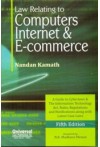- Author(s): Nandan Kamath
- Publisher: Universal LexisNexis
- Edition: 5 Ed Rp 2020
- ISBN 13 9789350351819
- Approx. Pages 847 + contents
- Format Paperback
- Approx. Product Size 24 x 16 cms
- Delivery Time 3-5 working days (within Kerala & South India) (Others 7-9 days)
- Shipping Charge Extra (see Shopping Cart)
Description
The Information and Communication Revolution (ICR), now under way throughout the world, is challenging established institutions and practices in manner difficult even to comprehend for ordinary folks. The systems of socio-economic organization and political governance are undergoing unprecedented changes compelling Governments to review the laws relating to management of knowledge in society. The industrial revolution has brought about its own set of laws regulating lot only business and commercial activity but also the governance of post-industrial society. As the industrial revolution affected only certain parts of he world leaving behind the former colonies, the legal systems of the so-called developing countries could not, as yet, equip themselves to the challenges of industrialization. Meanwhile, the ICR has overtaken the world, demolishing 'Economic barriers and political boundaries and challenging the established laws of even the industrialized world, Most developing countries of the world lave to make a quantum jump in law-making if they want to develop capacities to protect national interests and to avoid exploitation by those who own technology—the limits of which are still unknown. This is the dilemma hat India faces today by the advent of Internet, Information Highway and cyberspace.
.........................................................................................................................
Contents
1. “Sweeping Cobwebs off the Law” – The Law, Lawyers and Cyberspace
2. “A Global Medium in a Territorial World” – Jurisdiction and the Internet
3. “Tracking Digital Footprints” – Legal Effects of Electronic Evidence
4. Understanding Digital Signatures
5. “Cyberpirates” – the Internet and the Protection of Software Copyrights
6. “Name-Calling in Cyberspace” – Domain Names and the Law
7. A Practical Perspective on Hyperlinking, Framing and Meta – Tagging
8. Quelling the Cybercrime Challenge
9. Pondering Cyberporn in the Indian Context
10. Cyberstalking – A Web of Obsession
11. “Censoring Cyberspace” – In Search of an International Regulatory Norm
12. Cryptography, Privacy and National Security Concerns
13. Personal Data Privacy in the Online Context
14. “Trading in Bits” – Electronic Money and the Challenge to National Monetary
Sovereignty
15. Understanding online Credit Card Payments
16. “The Net and the Tax Net” – The Indian Tax Structure and the Challenges Posed by
E-Commerce
17. “Permanent” Establishments in Cyberspace?
18. The World Trade Organisation, Cross-Border Electronic Commerce and
Customs Implications
19. “A Sea Change in Trade” – Electronic Bills of Lading
20. “Letterless” Letters of Credit
21. A “Split” Verdict – Analysing the Microsoft Antitrust Trial
22. A Perspective on the Regulation of Converging Technologies
23. A Guide to the Information Technology Act, 2000
24. Cyberlaw Resources on the Internet
• The Information Technology Act, 2000
• The Information Technology (Certifying Authorities) Rules, 2000
• The Cyber Regulations Appellate Tribunal (Procedure) Rules, 2000
• List of Chairman and Members of Cyber Regulation Advisory Committee
• The Information Technology (Certifying Authority) Regulations, 2001
• The Information Technology (Removal of Difficulties) Order, 2002
• Notification on Instructions for Application of Sections 35(3), 35(4) and 70(1)
of Information Technology Act, 2000
• The Cyber Regulations Appellate Tribunal (Procedure for Investigation of
Misbehaviour or Incapacity of Presiding Officer) Rules, 2003
• The Information Technology (Other Powers of Civil Court Vested in Cyber
Appellate Tribunal) Rules, 2003
• The Information Technology (Other Standards) Rules, 2003
• The Information Technology (Qualification and Experience of Adjudicating
Officers and Manner of Holding Enquiry) Rules, 2003
• The Cyber Regulation Appellate Tribunal (Salary, Allowances and Other
Terms and Conditions of Service of Presiding Officer) Rules, 2003
• Procedure for Blocking of Websites
• The Information Technology (Use of Electronic Records and Digital Signatures)
Rules, 2004
• Allied Acts on Computer and Internet Laws
• Case Laws on Internet, Computer, Software, E-mail, etc.
Subject Index
.........................................................................................................................
Author Details
Nandan Kamath born in Bangalore, did his schooling in the city at the prestigious St. Joseph’s Boys’ High School and went on to join the National Law School of India University, Bangalore, the country’s premier legal institution, in 1995. He holds the top rank in the graduating class of 2000 at the law school. He was awarded the Rhodes Scholarship, India, for the year 2000, to pursuer his legal studies at Oxford University.
He has written numerous articles for newspapers and law journals on commercial and socio-legal issues besides being involved in many research projects and the presentation of numerous reports.
He has also represented the country at cricket at the under 16 level and has even captained his state team (Karnataka) in national level tournaments.
Nandan’s interests include Information Technology Law, Internet Laws and Intellectual Property Laws.
.........................................................................................................................

